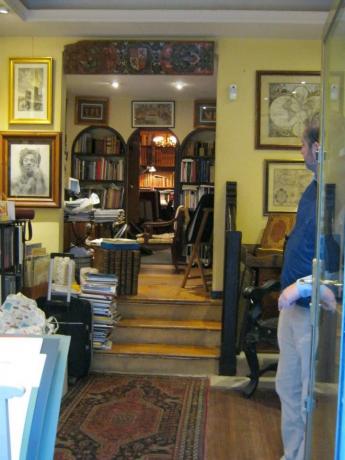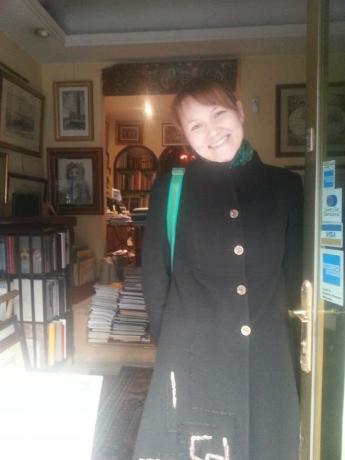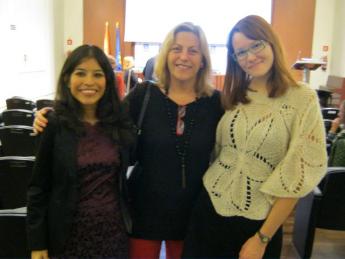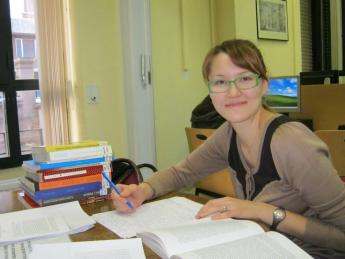Guild of Antiquarian Booksellers
ILAB Internships Out of the Classroom, into the World: Madrid, Spain 2013
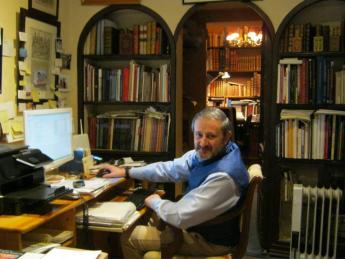
By Ksenia Batueva
Hello, dear friends! With this New Year fuss I’m a bit late with my final report – sorry about this.
My internship in Spain is over – six weeks, spent in this beautiful country, has ended up and I am back to Russia to my family. These two weeks in Madrid were full of impressions and events. Gonzalo Fernandes Pontes, president of AILA, and his wife Lourdes made everything to enrich my knowledge in antiquarian books and its market, to help me with my research, not to talk about their hospitality and readiness to give me a hand anytime.
The first week in Madrid was generally devoted to familiarity with Gonzalo’s bookstore and to the XVIth Salon of Antiquarian Books, the main event in the world of antiquarian books in Spain. Also I had interesting visits to the auction house Subarte and to the Museum of National Library.
Libreria Pontes – Gonzalo’s bookshop – differs from the stores of Javier Madariaga or Albert Casals: it is not a big enterprise, it doesn’t have a lot of items for sale and that’s why Gonzalo works there alone. Libreria Pontes specializes on high-end materials connected with geography and traveling: maps, views, atlases and, of course, books. Almost all the items are very valuable and have corresponding prices, so I had the great opportunity to see and describe very old,rare and famous editions; some of them had coat of arms of aristocratic Spaniards and well-known bibliophiles. Lourdes, Gonzalo’s wife, checked my descriptions and gave me some very useful advices as a professional bibliographer. Gonzalo works mostly on the international market: he participates in fairs abroad, has a lot of contacts with his colleagues and collectors from Europe and America. Gonzalo also has a very hopeful point of view on Russian antiquarian book trade – and I was really pleased to learn that there are some people, who are not indifferent to this subject. And, of course, I want to mention Gonzalo’s generosity (same as Javier’s and Albert’s): all three of them presented me so many books and catalogues, so I had to send a big parcel to Russia.
The XVIth Salon of Antiquarian Books in Madrid, a prestigious event, traditionally held in November or December, gave me some fresh impressions and many appointments with old and new acquaintances. As you can guess, “old acquaintances” were Javierand Iker Madariaga from Bilbao, Albert Casals and some of his colleagues from Barcelona – I was glad to see them again and to discuss some news. I want to tell you especially about two very famous persons among my “new acquaintances”: Francisco Asin Ramirez de Esparza – university professor, author of many articles and works, owner of an antiquarian bookstore in Zaragosa and just a great person. His book helped me much, when I was writing my diploma paper, and he was so kind to offer me any help in my future researches. So you can imagine how happy I was to be introduced to him. The second person is Luis Bardon Mesa – son of Luis Bardon Lopez, founder of, perhaps, the most famous and most important antiquarian bookstore in Madrid from the mid-20th century till nowadays. No doubt, the Bardon dynasty is the greatest family in this business. Now granddaughters of Luis Bardon Lopez successfully run the company.
The visits to the Auction House Subarte and to the Museum of the National Library were interesting. Subarte organized a pre-auction exhibition with books and antiques, and I accompanied Lourdes, when she went there. The Museum of the National Library surprised me a bit –because I did not find there as many old or famous editions, as I expected (like in the Museum of the Russian State Library), but it has a lot of artefacts, connected with the history of writing, typing, printing and even literature, also it has some contemporary objects, one way or another associated with books.
The second week in Madrid brought me new occupations, thanks to Lourdes. She is working on her own PhD now, so she has understood perfectly my situation and was very kind to organize some activities for me. First of all, Lourdes led me to Complutense University, which has a very good library and librarians, who gave me an access to all the books I needed. I spent there a very useful time, which, I believe, will help me in my work. Lourdes and I also visited a two days conference, organized by the Bibliographic Association in the National Library. Of course, I could not understand everything discussed there, but I received some information and had a pleasure to see the presentations. After that Lourdes introduced me to some lecturers and professors, such as Antonio Carpallo and others.
One of the weekends I decided to go to the Cuesta de Moyano – this is the name of the street and, at the same time, the name of one of the most famous places in Madrid, especially for booklovers. Cuesta de Moyano is the street market for antique and second-hand books (mostly second-hand). This place has a great history: the book market takes its beginning from the 20-s of XXth century, it has been very popular among Madrid habitants for many decades, famous bibliophiles used to come here, booksellers from Cuesta de Moyano were really influential in the world of the old book trade and writer Arturo Perez-Reverte even immortalized Cuesta de Moyano in his story. I assume, now this place is not so remarkable, but it still has a romantic halo with this wooden kiosks and beautiful surroundings and there still are bibliophiles, occasional customers and inquisitive tourists.
Madrid became one of the most elegant cities of Europe for me – with its graceful squares like Plaza del Angel, wonderful fountains on Paseo de Recoletos, charming cafes and restaurants, beautiful people on the streets and, of course, with its cultural symbol – the Prado Museum. I spent two days in the Prado, many hours observing and enjoying masterpieces of El Greco, Goya, Velazquez, Rubens, Bosch etc. Unforgettable! I also visited the Museum of Jose Lasaro Galdiano, who was one of the richest and most famous bibliophiles in Spain. He collected not only books, but also paintings, sculptures, jewelery, religious utensils etc.
I express my big gratitude to Gonzalo Fernandes Pontes, president of AILA, organizer of this internship in general and my curator for two weeks in Madrid. Surely, I’m very thankful to Lourdes Vinuela, who was kind, helpful, supportive, attentive to me, like to her own child. And also I want to say many thanks to everybody, who anyhow paid attention to me: Francisco Asin and his son, Luis Bardon and his daughters, Ortiz Marcos, Rosa from Blazquez Libros Antiguos, Antonio Carpallo and his fiancé, Fabian Cerezal.
Therefore, my post as well as my internship in Spain, has come to an end and I want to make some conclusion. Talking with antiquarian booksellers and making my notes evoked some contradictory feelings. On the one hand, the crisis influenced the antiquarian book business a lot in Spain: some stores are closed now, others have problems, and institutions no longer buy a lot of books – like 4 or 5 years ago, when some booksellers were forced to fire employees. Another problem is that the old generation of dealers does not speak English and practically never exhibits at international fairs. Also many professionals see a reduction of the bibliophilic culture.
But on the other hand, there is a light: rare, valuable books still have their wealthy customers and the Internet (especially, IberLibro – part of AbeBooks – perhaps, the best webpage in this business; and Uniliber, created as a Spanish analog of IberLibro) helps to find clients all over the world; we also can mention, that South America has potential clients for Spanish booksellers, because these regions are united through their language. Despite the crisis, nobody can say, that the government forgot about the bibliographic patrimony – one of my acquaintances even said: “As a bookseller, I’m happy, that the city administration spent thousands of euros on books for the city library, but I’m not happy about this fact as a citizen”. Important to mention, that the local government always supports antiquarian book fairs, giving money to professional associations, who organize these events. Talking about professional organizations, it is impossible to ignore the fact, that Spain has a lot of local and state associations of antiquarian booksellers. The presence of local bibliophily is also remarkable: Spain has almost 20 different regions and in many of them people are interested in their own history, culture, cuisine – they want to have a “local collection” of books.
I feel like we have some similar problems in Russia (of course, we have more of them), but,at the same time, Spain can be a good example to learn for us. I will try to use my experience and my notes in my research work and I will explore this subject more.
As you already understand, this internship in Spain was really a great experience for me. I will never forget this trip and I will try to make it to be a start for something more! And, of course, this would not be possible without the people, to whom I am very grateful: Olga Tarakanova – who was the initiator and one of the founders of this activity; Tatyana Panarina – she was the one, who persuaded me to participate in the internship; Alena Lavrenova – who helped to solve my difficulties in Russia, gave me a lot of advices and was very cheering during all my six weeks; Gonzalo Fernandes Pontes and his colleagues Javier Madariaga and Albert Casals for their consent and braveness to give this opportunity tome; Barbara van Benthem – editor of my reports; and, of course, to the main man and supervisor of this event – Norbert Donhofer, program creator and founder, who always tried to do his best for us from the beginning till the very end. Thank you and happy New Year!
>>> Learn more about the ILAB Internships
